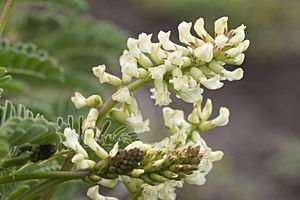Nuttall's milkvetch facts for kids
Quick facts for kids Nuttall's milkvetch |
|
|---|---|
 |
|
| Scientific classification |
Astragalus nuttallii, also known as Nuttall's milkvetch, is a type of wild plant. It belongs to a large group of plants called milkvetch. This plant is special because it grows naturally in specific sandy areas along the coast of California and Baja California.
Contents
Discovering Nuttall's Milkvetch
Nuttall's milkvetch is a fascinating plant found in North America. It was first described by botanists John Torrey and Asa Gray. Later, J.T.Howell officially named it Astragalus nuttallii. This plant is a great example of the diverse plant life found in coastal regions.
Where Nuttall's Milkvetch Lives
Nuttall's milkvetch loves sandy soils. You can find it growing near the coast in California and Baja California. It's a perennial herb, which means it lives for more than two years. It often forms thick, tangled clumps. These clumps help the plant spread out and cover the ground.
What Nuttall's Milkvetch Looks Like
The stems of this plant can grow up to a meter long. They can be either hairy or smooth. The plant has many leaves, some growing up to 17 centimeters long. Each leaf is made up of many small, oval-shaped leaflets. This gives the plant a full and bushy appearance.
Flowers and Fruits
Nuttall's milkvetch produces many flowers. They grow in a large, dense cluster called an inflorescence. Each cluster can have up to 125 flowers. Each flower is about 1 to 1.5 centimeters long. The flowers are usually a dull cream color. Sometimes, they have a hint of purple.
After the flowers bloom, the plant produces a special fruit. This fruit is an inflated legume pod. It can grow up to 6 centimeters long. When the pod dries, it becomes papery. Inside, it has a single chamber filled with many seeds.
Ocean Bluff Milkvetch
One special type of Nuttall's milkvetch is called the ocean bluff milkvetch. Its scientific name is Astragalus nuttallii var. nuttallii. This variety is endemic to the Central Coast of California. This means it is found only in that specific area and nowhere else in the world. It's a unique part of the local ecosystem.

